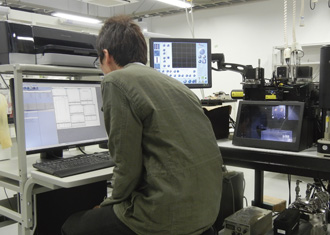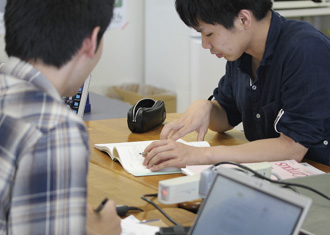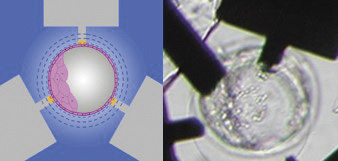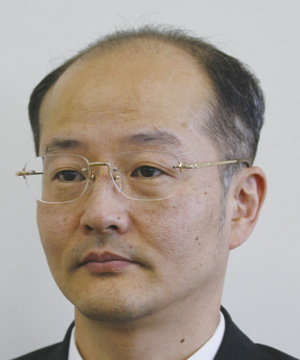Electrochemical Science and Technology
Development of electrochemical sensors for medical, energy device, and environmental fields


Electrochemistry has been playing a significant role in industry, from energy conversion to biosensing. To construct highly effective electrochemical energy conversion or high-throughput biosensing systems, principles underlying biological systems will be useful; chemical/electrical signal transduction, network of gene expression, and electron and/or proton transfer at cell membrane.
We have developed high-throughput bioanalytical systems and patterning technique of different biomaterials for electrochemical sensing. Technical strength of our research concerns on manufacturing of micro/nano electrode and precise measurement of faradaic current at picoamper (10-12 A) scale. This technique would be valuable for the scientists in different research fields, including medicine, cell biology and livestock research. Fusion research of different backgrounds will explore the possibility of the electrochemical sensors. For instance, we constructed an instrument to measure localized oxygen concentration of single mammalian embryo based on microelectrode probe. This instrument is commercially available and expected for characterization of bio-samples of cell transplantation and regenerative medicine.
High-performance electrochemical analysis is accessible by combining the microfabrication of micro/nano electrode, nanomaterial science and micromachining. We constructed an integrated electrode array device with more than 1,000 detection points to monitor alkaline phosphatase activity, a significant enzyme indicator of undifferentiated status of mouse embryonic stem cells. Needle-type nanoelectrode has been applied for the scanning probe to visualize localized electrochemical activity of the sample surface.
Students in our lab learn not only the basics of the electrochemistry but also the research backgrounds of the targeted samples. We have realized electrochemical sensing of biomaterials including proteins, DNAs, cells and tissue models. In future, large-scale assay of functional nanomaterials will be achieved to contribute solving energy and environmental issues or to be helpful for next-generation practical healthcare device.

Main Research Themes
- Development of research tool for characterization of embryos and embryonic stem cells
- Nanoscale multianalyte sensing system
- Characterization of functional materials and energy-device materials based on high-resolution scanning probe microscopy
- Development of electrochemical imaging device and applications for chemical sensor

Dr. Eng
Hitoshi SHIKU
Graduated Okayama Sozan Senior High School. Earned Doctor of Engineering from Graduate School of Engineering, Tohoku University, in 1997. 1996-1998 JSPS research fellowship for young scientists; 1998-1999 Postdoctoral Fellow, University of Kansas; 1999-2003 Senior Researcher, Yamagata Public Corporation for the Development of Industry; 2003-2007 Assistant Professor, Graduate School of Environmental Studies, Tohoku University; 2007-2016 Associate Professor, Graduate School of Environmental Studies, Tohoku University; 2016-present Professor, Graduate School of Engineering, Tohoku University.
I play soft tennis and aikido since I was a high school and undergraduate student. I worked hard and enjoyed experiments when I became a member of an electrochemistry lab. I was lucky to find out target contents those used to be unfamiliar with electrochemists and established electrochemical methods for evaluation of embryos, embryonic stem cells, etc. Collaboration with researchers of different backgrounds is encouraging the acceleration of application field of electrochemical methods.

